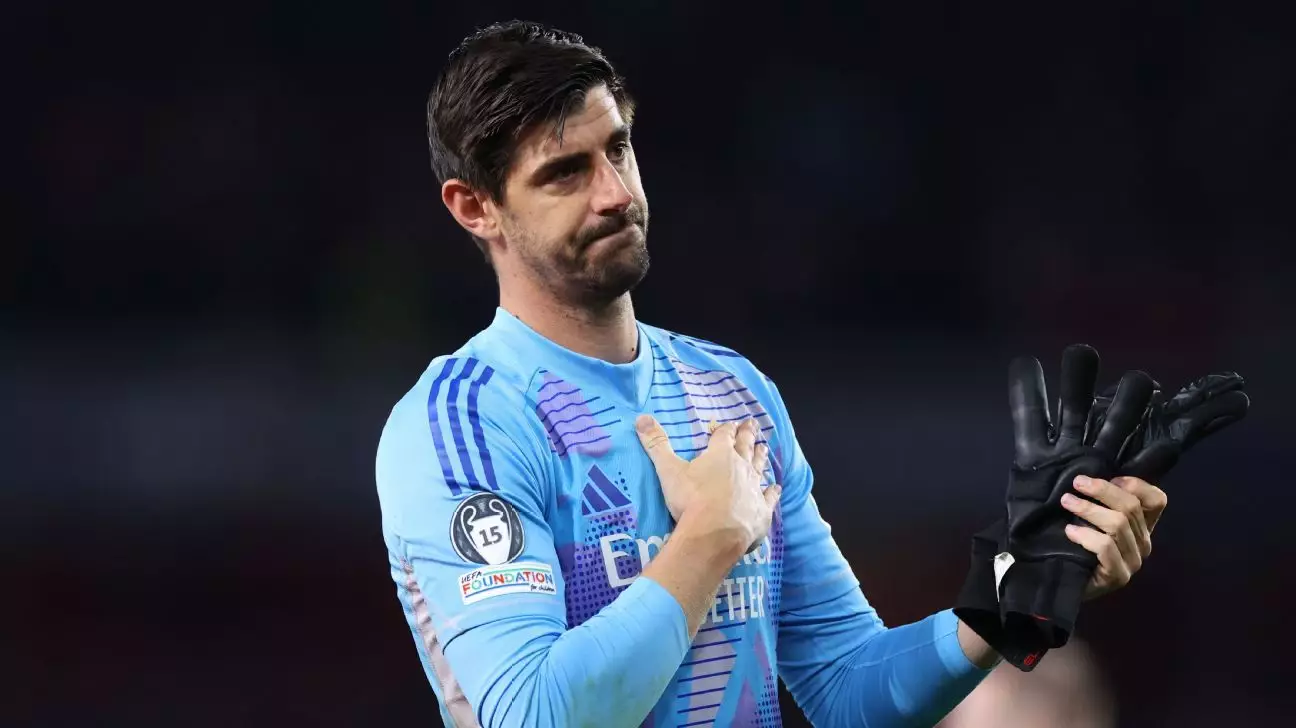In the world of football, no club carries the legacy and expectation quite like Real Madrid. With a storied history that boasts 15 European Cup victories, the sheer pressure to perform can weigh heavily on players and coaching staff alike. Recently, this weight became palpably clear during their unsettling 3-0 defeat to Arsenal in the Champions League quarterfinals. After this shocking loss, the players and management are left at a crossroads—wondering how a club of such caliber could falter so spectacularly against an opponent that historically hasn’t achieved the same heights.
Goalkeeper Thibaut Courtois stepped up post-match to shoulder the blame for Declan Rice’s stunning free-kick, a situation that encapsulates the burden of responsibility felt by every member of the squad. Courtois has proven his mettle time and again under pressure, but this outing left him questioning his wall positioning and tactical choices, highlighting that in critical moments, even the best can falter.
Unpredictability of Football
The unpredictability of football was on full display as Rice, who had never scored directly from a free kick before, found the net not once but twice, turning the tide against a timorous Madrid side. This incident serves as a reminder that in football, greatness can come from the most unexpected sources. It brings into focus the need for Madrid to rethink their defensive strategies and instill a sense of alertness in every situation, as careless fouls led directly to Arsenal’s advantage.
Real Madrid’s defensiveness and basic tactical errors were expertly exploited by an Arsenal side that played with aggression and intent that night. The notion that a club with Real Madrid’s pedigree could overlook such details raises questions about their current mentality and readiness for critical matches. They will have to digest this bitter pill and come back stronger if they hope to retain their status amongst Europe’s elite.
Lessons from the Past
History has shown that Real Madrid has an uncanny ability to mount comebacks in dire situations, as evidenced by their path to the Champions League final last season, which saw them overturn significant deficits against Paris Saint-Germain and Chelsea with sheer grit and talent. Coach Carlo Ancelotti, who guided the team during that glorious run, now finds himself navigating treacherous waters, urging his players to harness that latent ability and find the “belief” that has carried them through past turmoil.
In his post-match comments, Ancelotti acknowledged the daunting challenge ahead, revealing a mixture of realism and hope. He recognized the uphill battle following such an uncharacteristic performance, yet he still pointed out that “football is change” and anything is possible in the return leg at the Santiago Bernabéu. Therein lies the duality of sports—a continuous cycle of despair and hope, a pendulum that swings toward both extremes throughout the course of a season.
A Call to Action
As Madrid prepares to face Alavés and subsequently welcomes Arsenal back for the return leg, the mentality throughout the squad will be critical. Lucas Vázquez echoed sentiments of resilience, reminding everyone that they possess the capacity to turn the tie around. The power of their home crowd can amplify that belief; the Bernabéu has been a fortress of dreams for countless Madridistas, and they’ll need that fervor to rally behind their team in their moment of need.
Midfielder Jude Bellingham hit the nail on the head when he described their need for humility and introspection. The sobering reflection on their past performances is essential; achieving lasting success often hinges on evaluating weaknesses and growing from the experiences of failure.
Madrid’s journey is far from over, and while the tasks ahead are daunting, the rich history of the club offers a glimmer of hope. Yet, it’s imperative that the players realize that embracing pressure and confronting challenges will define not just their immediate future, but the broader legacy of a club that stands tall in the pantheon of football.

